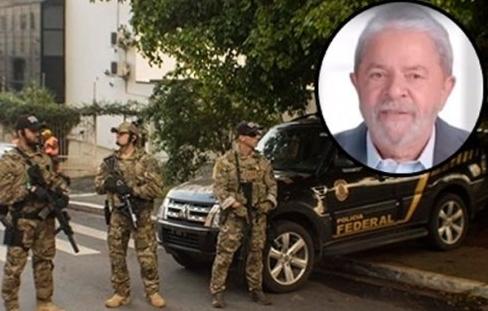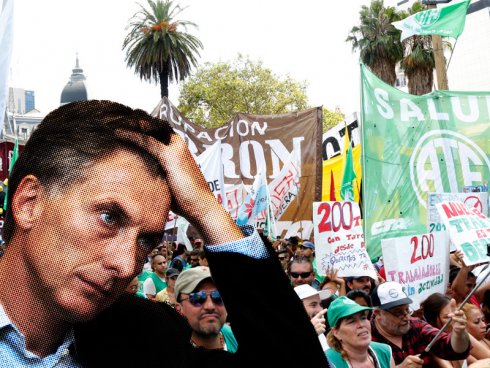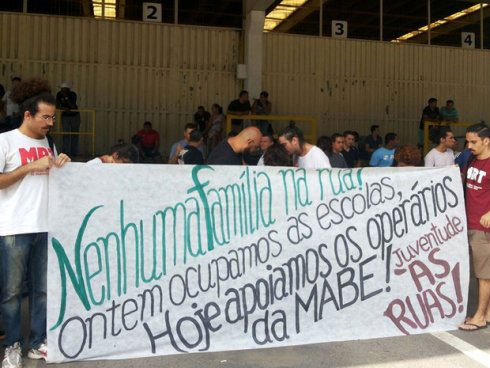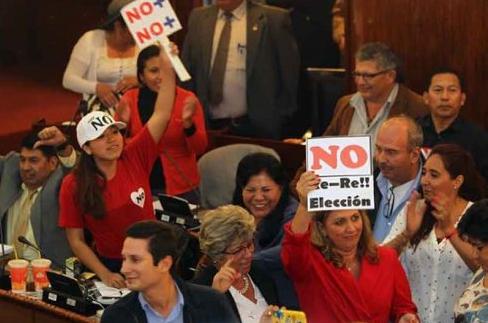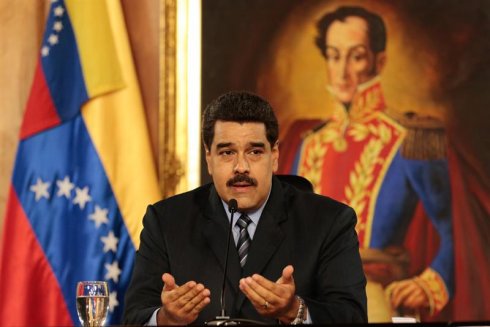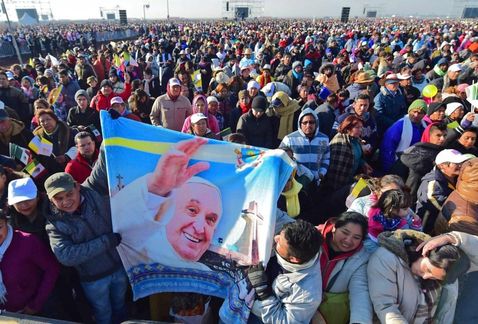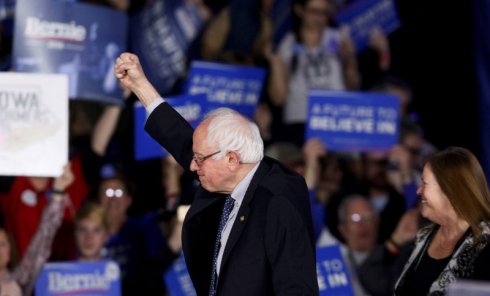The political crisis in Venezuela. Maduro is trying to direct a dialogue with the moderate right wing
27/02/2014
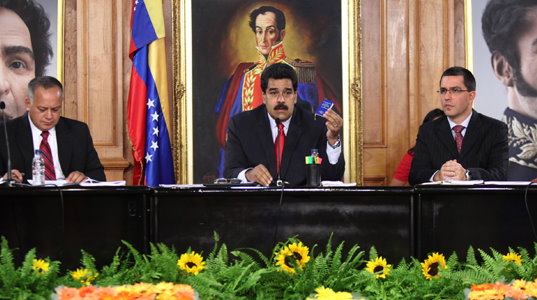
Interview | The political crisis in Venezuela
Maduro is trying to direct a dialogue with the moderate right wing
February 27, 2014
We interviewed Angel Arias, a leader of the Liga de Trabajadores por el Socialismo, a sister organization of the PTS, so that he would tell us about the current situation that is being experienced in the country and the main discussions that are beginning.
Tell us how the political situation is continuing after the tense week of mobilizations and confrontations.
Although up to yesterday several focal points were continuing in some middle class areas of the capital and other cities of the interior, with even some new case of people wounded by bullets or dead from attacks of armed groups from chavismo or by gunshots from right-wing people (or because of the objects put on the barricades), they are of less intensity and force, since the calls to dialogue and the "marches for peace" have been occupying the center more. The big march of Saturday, called by Henrique Capriles and the MUD was like that, and the calls by the government. As a clearer point of this is the setting up today of the "National Conference for Peace," convened by the government, that, although it did not have the formal participation of the MUD nor of Capriles, it did indeed have the presence of the leaders of the main Chambers of Commerce and eminent bourgeois like Lorenzo Mendoza, in a "constructive" dialogue with the heights of government, broadcast on a national radio and television network.
For that reason, talking about a coup d’état, as the government is doing, in these moments, is not very certain, not necessarily because it is not among the plans of groups of the far right – who were participants in the 2002 coup and the employers’ lockout and 2002-2003 oil sabotage, and so was the wing that now places itself as more moderate – but because it is not the line, for now, of the majority groups of the opposition; it did not seem to be the line of US imperialism for now, either, and, on the other hand, this more "radical" group of the right does not have the strength nor the conditions to carry out a coup.
Among other things, in order to carry out a coup there has to be some military group in the conspiracy, and, for now, two weeks having passed since the point of a strong outburst of these protests (February 12), the armed forces have issued statements that they remain on the government’s side, without indications of breaks – at least, public ones – of active commands, as was the case in 2002, and still even years later.
In addition, as I said, to the big division in the very ranks of the bosses’ opposition, there are clearly two differentiated wings: one, that still continues to be the majority group now, with a position more of a "long-term strategy," that bets on the exhaustion of the government, in the face of the crisis – everyone knows that it is Maduro who has been paying and will pay the political cost of the anti-popular economic measures – to undermine it through a sort of turn towards "connecting with the demands from different groups of the people in the street," that, up to now, says it is betting on a defeat of the government, but in the electoral field, and says it publicly rejects the "quick roads" and the "short cuts that do not lead anywhere," and a "hard wing," that says it is necessary to stay in the streets "until Maduro leaves."
On the other hand, US imperialism is increasingly sticking its nose in, but in order, for the moment, to pressure the government, obviously placing itself on the side of the right wing, and supporting its actions, advocating for the leaders of the extreme right, with its well-known demagogic talk about "democracy" and "human rights" as a cover for its interference. Although, at the same time, it does not leave the government completely, with its hand extended, since, on the naming of a new Ambassador by Maduro, Kerry now answers that the US would be "prepared for a change in the relations with Venezuela," since the bilateral tensions "have lasted too long."
Summarize for us a little, the economic and social situation that is being experienced
There is a severe economic crisis, marked by an exhaustion of the model with which Chávez’ management moved in the last six or seven years, approximately. It is basically expressed in severe inflation – 3.3% in January alone, after closing 2013 with 56% – and a big shortage – 28% in January – of goods and basic products, including medical supplies. Behind this, a relative shortage of dollars in the country and the struggle for the profit level of the capitalists.
The country apparently does not have the dollars necessary to cover the needs of the national economy, for payment of the debts and the purchases needed both by the state and by private groups, and the state is minimizing foreign currencies. This threatens a paralysis in sectors of the national economy, given that businessmen are claiming a lack of dollars to pay debts to suppliers overseas – who are not shipping any more until they catch up – and for new purchases. So that the shortage would be not only of consumer goods but also of supplies for industry (raw materials, spare parts, machinery, etc.). In turn, the government has kept, for years, an unenthusiastic and powerless control of prices – as the inflation figures show! – and recently it has also proposed "controlling profits" (in order "to allow a maximum of 30%"), in order to confront inflation – with a law that the main organizations of employers marked as "unconstitutional" and "inapplicable."
The national bourgeoisie claims that the reasons for scarcity and inflation are in the control of exchange and of prices, that it is necessary to "free" the dollar and to "free" prices.
But, "How are we in this crisis with a barrel of oil at an average near 100 bolívares in the most recent periods?" some people are wondering. The key issue is that our country, in spite of what the government proclaims, has not come out of dependency and subordination that imposes imperialist capitalism’s worldwide division of labor on us: exporters of (one!) raw material (petroleum, for which 97 out of every 100 dollars enters the country) and importers of everything else; also, in spite of the talk about "anti-imperialism," the country continues to be subject to the numerous mechanisms of imperialist pillaging, like the millions of "dollars of the people" that constantly leave in payments of the foreign debt, or the profits that the hundreds of transnational corporations that operate in the country send to their headquarters. In addition, the national capitalists have not stopped the "flights of capital": even with control of foreign exchange, the private sector went from owning 49 billion dollars overseas in 2003, to more than 166 billion, at the end of 2013, a figure that, to give us an idea, is equal to two and a half times this year’s entire national budget.
Then, all these years, the "growth of the national economy" was established in practice on the biggest revenue as oil income – by a combination of the government’s struggle with the transnational corporations so that a little more of this remained for the national state, and of the long period of high prices per barrel – and a strong and continuing increase of the state indebtedness. Now we are reaching a 15% government deficit, according to the lowest estimates, a heavy public indebtedness (for 2012 the total debt was more than 102 billion dollars, a figure similar to almost 40% of the national GDP then; in 2014, the payments of the public debt – most of which is external – will grow 55%, compared to 2013, taking 22% of the national budget) and a shortage of dollars, because practically the only way of getting them is the state revenue for petroleum and because the quantity of foreign currency available cannot continue to support the level of imports of the most recent years, during which imports have increased exponentially.
Anyway, the persistence of profiting from collecting rents and economic dependency are at the basis of this crisis, as well as the continuation of ownerships, businesses, and usury of the national capital.
Having said that, where a group of the right-wing student movement has a lot of influence, even when those who mobilize make a high-profile central concept of the democratic right to protest, their demands, their "program," in which it makes the economic crisis none other than the fact that the country kneels in front of the demands of business. They certainly talk about scarcity, about inflation, problems endured by all the working people, but their solution is completely "liberal": "No more controls!" "No more state control!" is their slogan. In addition to confirming and completely legitimizing the mechanisms of imperialist plundering, since they do not question a single one of these mechanisms, in fact; instead of raising, for example, non-payment of the foreign debt, what they say is, "We must stop giving oil to Cuba and the countries of the ALBA or Petrocaribe."
Could you tell us what the situation is inside chavismo?
Well, certainly chavismo appears united, facing the situation, or it was looking that way. Since Chávez’ death – almost a year ago – they had managed to "close ranks" to confront the new situation, full of uncertainties, like, for example, the early presidential elections and the instability of the following days, after the unexpected outcome, so close. However, in front of the worsening of the economic crisis, some public differences have now begun to appear, about the ways or the tempos for applying the austerity measures – something inconceivable under Chávez –, with one group more inclined to give in quickly to the demands to dismantle the control of foreign exchange and another that wanted to go slowly.
But it was this situation that showed some differences more clearly, like the recent case of the Governor of the (state) Táchira – epicenter and bastion of the student demonstrations, in addition to bordering on Colombia – who clearly distanced himself from the repressive measures carried out by the central government in his jurisdiction (that included the overflight of the state by military airplanes) and proposed the release of Leopoldo López, Iván Simonovis (a police superintendent sentenced because of the 2002 coup) and "all those who are prisoners because of political matters" (that is, he talked about "political prisoners") as a basis for the national dialogue; indicating in passing that he "is not part of the regime," in the sense that he was "elected by popular vote," that when it was Chávez, he kept an "autonomy of thought and voice," and he would keep it now. A former chavista Governor, a leader of the PSUV, Tareck William Saab, questioned the violence, but also the "excesses" of the repression, calling for investigating them and punishing them; he suggested that it is bad "to call a political adversary ’unpatriotic’ or a ’traitor,’ because he has a different idea than yours" (referring to the government’s descriptions of the opposition), and he stated that "this is not the time of the extremists; it is the time of those of use who want dialogue and peace, of those of us who want non-violence and respect for those who can think differently."
There is also much speculation about the position of strength that Diosdado Cabello would have inside the government, to the detriment of other groups, including Maduro himself. Certainly, his level of public exposure and centrality in some government actions are not "normal" for a regime where the President is also the Chief Executive, and with strong elements of Bonapartism. We must not forget that Diosdado is, in addition to being President of the National Assembly, the senior leader in the PSUV – its formal chief, after all –, since after Chávez, he was following, and he has big influence among retired and active soldiers, as one of the officers that rebelled with Chávez on February 4, 1992.
Is it possible to rule out completely the possibility of a coup d’état, bearing in mind that they already tried it in 2002 and 2003, and that the US historically wanted to remove chavismo from the government?
It is absolutely not possible to rule out that possibility, because of what you are saying, and, especially, because the stage that has opened up with Chávez’ physical disappearance, is one of instability and abrupt changes; the transition to a new regime of post-chavista power will not necessarily be gradual and peaceful. Even more, with the addition of the exhaustion of an entire economic way of thinking that cannot remain standing any longer; the disappearance of the leader of the masses that put his imprint on the country and the regime during almost 15 years coincides with the development of a severe structural crisis of the economy.
A setting like that cannot be ruled out, facing a worsening of the economic crisis, a modification in the correlation of forces inside the opposition, higher levels of social dissatisfaction or an emergence of the workers’ movement with its own demands, making the country more "ungovernable," or that these "extreme" groups of the right wing will manage to undermine the unity that the armed forces, etc., are now showing.
A setting facing which, without any kind of doubt, it is necessary to be resolutely on the front line of confronting the coup, as, in fact, we were in 2002 and 2003, the militants from here, that, in subsequent years, joined the FT, and the FT itself as an international tendency.
What do you think of the most recent statements of Heinz Dieterich (the ideologue of "twenty-first century socialism") who is proposing a national unity government between Maduro and Capriles?
That they are from a completely defeatist view, more appropriate from an academic, or a "scientist," as he says himself, than from a revolutionary politician. But, in addition, even in this field, they are not very "scientific" either, because he omits key elements of reality, like the fact that the transition from chavismo to post-chavismo cannot be gradual and agreed upon: he does not take into account the relative levels of political independence that the country has achieved, and that imperialism will want to reverse in any way possible; the expectations of the working class and the poor people with chavismo, that will not peacefully tolerate losing true economic conquests or the attacks on the already compromised standard of living; the central role of the armed forces in national political life and in control of big areas of the economy in the hands of the state!, a group that would have much to lose in a more "neoliberal," and less statist way of thinking, a group that can be very "patriotic" about its own economic areas of power, and several other elements that he does not take into account.
In fact, Dieterich makes it quite clear what it is that would be at stake; he says, "The adjustment and restructuring of the economic system, according to the current objective conditions, is an imperative for any political force that is in the government. It is not a matter of wanting, but of having to do it. And the only thing that must be negotiated between both forces is, who pays the social costs of the crisis. That is, what classes and social groups will lose in the adjustment." Precisely, in "the only thing" that must be negotiated is one of impossibilities of a national agreement that "will prevent civil war" – Dieterich’s clearest basis for his proposal – since it involves "coming to an agreement" that the working class and the poor people will pay the costs of the adjustment, which will not be accepted submissively by a workers’ movement that, although very fragmented and weak, organizationally and politically, has not experienced any defeat of significance in the most recent decades.
And also there is shown the frame of mind totally alien to the necessities of the workers’ and people’s struggle that the proposal has, on the one hand, because it goes on simply to accept that those from below will pay the costs of the adjustment, "to prevent civil war," and because it appears to see only the possibility of a surge of the situation on the right, without setting out the perspective or betting on a class-conscious and revolutionary policy where the workers will make their weight felt in the crisis and in national politics, fighting to tip the scales on the side of the exploited, struggling for a powerful worker-peasant-popular alliance that will show a way of overcoming on the left, the obvious failure of the spineless bourgeois nationalism that Chávez headed.
Finally, what is the policy and the program that you are proposing from the LTS?
Here we have been making a central theme of clearly showing the content of these mobilizations, that make demagogy out of the problems of working people and try to champion "popular dissatisfaction," also explaining that the government itself has an agenda of unloading the economic crisis on working people, and emphasizing therefore the need for the working class to burst in on the scene with its own demands and methods of struggle, in opposition to the demands of the right wing and the very policies of the government.
The key issue is that, faced with the worsening of the crisis, the government and the businessmen are discussing and negotiating the rates of the adjustment; a middle-class group, having become right-wing, has gone out forcefully to press for a solution to the crisis, on the right – both regarding the economic measures and the mobilizations’ character "of removal" –, but the working class does not appear with its own demands. It is a force, potentially enormous, that, excited, attends, among other things, because of the union bureaucracies, completely committed to the respective employers’ projects of the government or of the opposition, in most cases.
So we have been discussing both the need for a program that will aim at changing the imperialist profits and those of the national capitalists, and the struggle that must be waged from the rank and file, organized and in struggle, of the working class, in order to get rid of those sealed-off bureaucracies in the workers’ organizations, that condemn the country’s biggest and potentially most powerful social class to powerlessness.
We are proposing, then, the coordination of the many struggles that are now taking place in isolation – and, many times for that reason, defeated – the drive for spaces of coordination and unity of the struggles under way, for development of class solidarity, of workers’ meetings that will unify the demands and that will offer our class a program in the face of the national crisis, that will include the struggle against payment of the foreign debt and against the acquisition of wealth by the imperialist capitals, against devaluation, for wages equal to the family food basket and a sliding scale of wages, for control of prices directly exercised by workers’ and people’s committees, without any subordination to the government, for the opening of the accounting books of the firms that claim "losses," for the nationalization without compensation and under workers’ administration, of the food monopolies and the businesses responsible for the flight of dollars, for workers’ control of every enterprise that fires workers or threatens to close, for the monopoly of foreign trade based on control by workers’, peasants’, and people’s organizations, among other demands.
